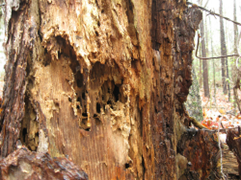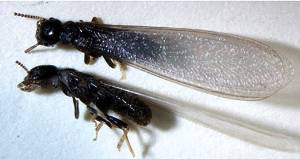Termites in Trees

This week I had a question regarding termites that were found in half of a dying Osage Orange or Hedge tree. While we most commonly think of termites in the house, termites are insects that feed on dead wood in trees and structures made of wood. They are in the taxonomic order Isoptera, which is closely related to the cockroach. Contrary to common belief, they are not related to ants which have different antennae, bodies, and wings. Termites in your home, or other structures, feed on the wood and cellulose components. If you have termites in your tree, it means that they are feeding on the dead wood in that tree. Termites are often confused with carpenter ants. If you have either one of these insects in your tree, you likely have dead wood in your tree. This could be the natural decay of the heartwood in a mature tree or caused prematurely by diseases or other insects. If you see a lot of termite activity on your tree, then you most certainly have dead wood contributing to your termite problem. All trees can be affected by termites since they all contain cellulose. Termites’ hard mandibles can chew through tough materials like plastics and drywall.
Unfortunately, there are not many options when it comes to treating termites in your tree. Hiring a Certified Arborist or certified applicator who is also certified to apply insecticides for termites is recommended. The arborist can also perform a risk assessment of your tree to determine how much of your tree is dead. Pruning away infected dead wood is a good way to begin to remove the food source for termites. Make sure that all of the wood is destroyed; this can most easily be done by burning it. Termite traps can be purchased and installed around the tree, but make sure to follow all of the safety recommendations. Always monitor your tree after any treatment to see if termite activity returns. Never store old wood piles near healthy trees, and be sure to remove any old rotting stumps.
Certified Arborist or certified applicator who is also certified to apply insecticides for termites is recommended. The arborist can also perform a risk assessment of your tree to determine how much of your tree is dead. Pruning away infected dead wood is a good way to begin to remove the food source for termites. Make sure that all of the wood is destroyed; this can most easily be done by burning it. Termite traps can be purchased and installed around the tree, but make sure to follow all of the safety recommendations. Always monitor your tree after any treatment to see if termite activity returns. Never store old wood piles near healthy trees, and be sure to remove any old rotting stumps.

Have questions? Contact our office where our Horticulture Extension Agent will assist you with questions.
Phone: (316) 321-9660
Email: callae@ksu.edu